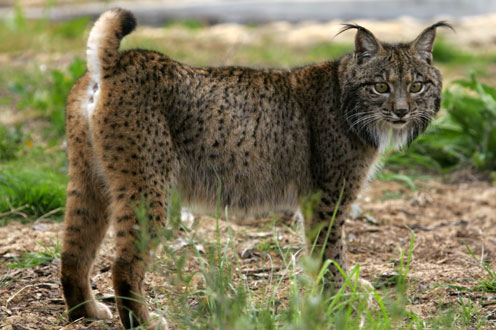Following its entry into force in April 2018, Spain became the first European country to transpose the EU Action Plan against Wildlife Trafficking (2016-2020) into national legislation.
The central goal of the plan is to prevent illegal trafficking and poaching by attacking the causes at source while also involving public authorities and civil society, as well as acting both a national and an international level. For 2020, the driving forces behind the plan have set targets to continue training all links in the coercion chain and working with the countries of origin of illegal wildlife trafficking.
The most outstanding initiatives developed under the plan last year include:
- Blows to the trafficking of wildlife species
In partnership with the Nature Protection Service (SEPRONA) of the Spanish Guardia Civil, the Ministry for the Ecological Transition and Demographic Challenge has conducted various operations to tackle illegal wildlife trafficking on various fronts.
These included Operation Taxideralia, which concluded in February 2019 with the seizure of more than 200 specimens of protected species brought into the country from illegal taxidermy workshops. Operation Taxideralia began after identifying a proliferation of Internet adverts in 2018 selling stuffed animals from species protected under the CITES (Convention on International Trade in Endangered Species of Wild Fauna and Flora).
Operation Celacanto, which ended in July 2019, confiscated 2,296 specimens of 70 species of fauna protected under international conventions and valued at over one million euros. The operation was coordinated by Europol in Europe and Interpol worldwide. Over 2,000 establishments selling animals, wholesalers, private collectors and antique shops were searched in Spain. At the same time, coordinated inspections were conducted at ports and airports.
Forming part of Operation Thunderball (coordinated by Interpol), the third stage of Operation Celacanto mainly focused on the illegal trade in African elephant ivory. The operation concluded with 1,669 items seized, including 543 pieces of ivory valued at over 400,000 euros.
- Training for SEPRONA officers and support for science
The prior training received by SEPRONA officers was essential to the success of these operations. The officers were given high-level specialisation courses, such as on the recognition and identification of ivory.
In partnership with the CSIC National Accelerators Centre, the TIFIES Plan promoted the update of isotope C14 analysis for dating pieces of ivory. This is a reliable scientific method for precisely dating when the elephant died. The systematic application of this technique to ivory declared as antique will help combat fraud and breaches of CITES regulations through the illegal trade of ivory. At the moment, only those ivory carvings dated prior to 1947 can be legally sold without a CITES certificate in the European Union and therefore considered as antiques.
Furthermore, and in partnership with the Higher Technical School of Mountainside, Forest and Environmental Engineering, the MITECO has given macroscopic wood anatomy courses to 56 SEPRONA officers as part of an operation against the international wood trade that remains ongoing.
Besides this training, the officers were given a Wood Early Warning Guide that includes all the types of wood protected by the CITES convention, and a kit containing tools for taking wood samples and two magnifying glasses that can be attached to mobile phones for magnifying the image up to 400 times to thus enable the particular features of each type of wood previously defined in the guide to be seen more clearly. In this way, when the officers come across documentation that does not correspond to the species of wood reported, they can activate the early warning system and provisionally immobilise the shipment.
- Combatting the wildlife trade at source
The TIFIES Plan launched the Ecoguardas programme, an initiative forming part of the EU "NaturAfrica" strategy to protect wildlife in Africa and offer green economy opportunities to local populations throughout Africa.
In this regard, Ecoguardas includes training and more modern equipment for the local environment wardens in various African countries, as well as the integration of new technologies to more effectively combat environmental offences on the ground, especially poaching.
- International conferences
Strengthening cross-border cooperation is essential in dealing with the illegal wildlife trade, which is often structured like organised crime and not only affects the species and their habitats but also the local populations.
Hence, at the Lima Conference held in October 2019, the MITECO presented the various lines of action launched by Spain under the TIFIES Plan and attended the work sessions organised to exchange experiences and encourage solutions for preventing and dealing with the illegal wildlife trade and encouraging involvement by civil society. Spain signed the Lima Declaration through the MITECO, demonstrating its commitment to the fight against the illegal trafficking of wildlife in Ibero-America and to cross-border cooperation in this regard.
Building ties with NGOs and scientific bodies. 23 private entities and scientific and conservation bodies joined in the work being done under the TIFIES Plan over the last year following approval of the Resolution of Partner Entities. This encourages involvement by civil society in the fight against the illegal trafficking and international poaching of wild species of flora and fauna.
The contribution from non-profit organisations, private companies, research centres and universities, the socially aware and those committed to the fight against the illegal wildlife trade is essential to both raising awareness in society as a whole and actively working with the public authorities on actions aimed at combatting these illegal activities.





